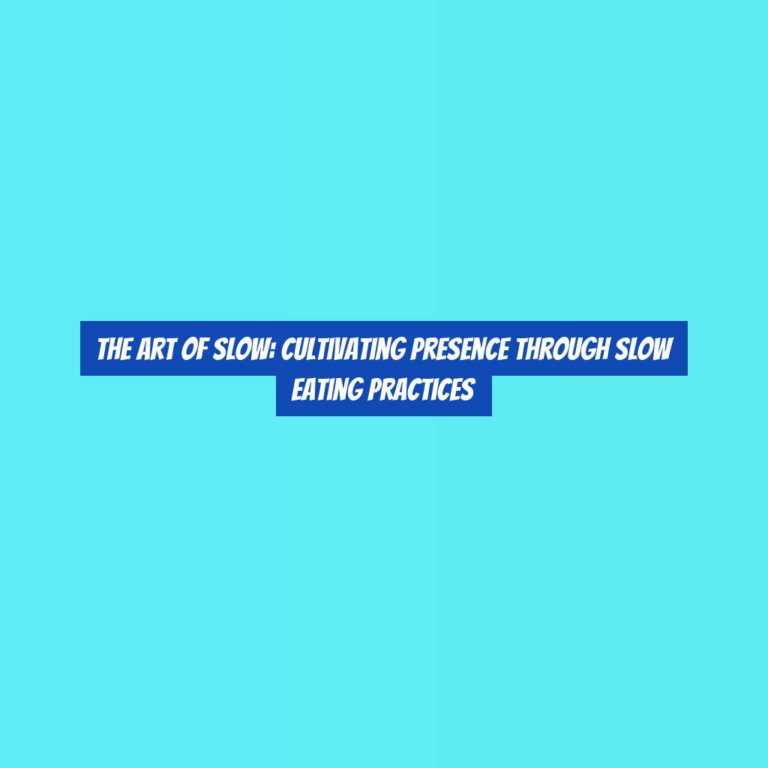Savor the Flavor: Unveiling the Remarkable Benefits of Eating Slowly
Have you ever considered the impact of your eating pace on your overall well-being?
In todayG??s fast-paced world, the act of savoring each bite may seem like a luxury rather than a necessity. However, what if I told you that there are remarkable benefits to be gained from the simple act of eating slowly?
The way you consume your meals can have a profound effect on your digestion, nutrient absorption, and even weight management. Intrigued?
Keep reading to uncover the surprising advantages of embracing a slower approach to dining.
Enhanced Digestion
To enhance your digestion, try chewing your food thoroughly and savoring each bite. When you take the time to chew your food slowly and mindfully, you allow your saliva to mix thoroughly with the food, kickstarting the digestive process. The enzymes in your saliva begin breaking down carbohydrates, making it easier for your body to absorb the nutrients. Additionally, chewing your food well helps to reduce the strain on your stomach and intestines, as the food particles are already broken down into smaller, more manageable pieces.
By savoring each bite, you also give your brain the opportunity to signal to your body when youG??re full, preventing overeating and promoting a healthy weight. Eating slowly and mindfully can also reduce the likelihood of experiencing digestive discomfort, such as bloating and gas, as it gives your digestive system the time it needs to process and break down your food efficiently.
Incorporating these mindful eating habits into your daily routine can lead to improved digestion, better nutrient absorption, and overall digestive comfort. So, take a moment to slow down, chew your food thoroughly, and enjoy the full benefits of enhanced digestion.
Improved Nutrient Absorption
How can eating slowly improve your bodyG??s ability to absorb essential nutrients from your food? When you eat at a slower pace, your body has more time to break down the food, leading to improved nutrient absorption. HereG??s how it works:
-
Enhanced Enzyme Action: Chewing food slowly allows enzymes in your saliva to begin breaking down carbohydrates while also signaling the stomach to start producing digestive juices. This initial breakdown process facilitates better nutrient absorption in the intestines.
-
Improved Micronutrient Release: Eating slowly aids in the release of essential vitamins and minerals from food. This is particularly important for nutrients like vitamin B12 and iron, which require thorough chewing and digestion for optimal absorption.
-
Better Blood Sugar Control: Slow eating can help regulate blood sugar levels, preventing spikes and crashes that can affect the bodyG??s ability to absorb nutrients effectively.
-
Enhanced Satiety: By eating slowly, you give your brain more time to receive signals from your stomach that youG??re full, which can prevent overeating and support the bodyG??s ability to utilize the nutrients from your meal more efficiently.
Weight Management Benefits
Eating slowly can contribute to better weight management by allowing your body to accurately register feelings of fullness, leading to reduced overeating. When you eat at a slower pace, your brain has more time to receive signals from your stomach indicating that youG??re full. This can prevent you from consuming excess calories before your body has a chance to recognize that itG??s satisfied. As a result, you may find it easier to maintain a healthy weight or even shed some extra pounds.
Furthermore, eating slowly gives your digestive system the opportunity to work more efficiently. Chewing food thoroughly and taking your time during meals can aid in better digestion and nutrient absorption. This can help prevent weight gain by ensuring that your body is able to extract the necessary nutrients from your food, rather than storing it as excess fat.
In addition, savoring your meals and paying attention to each bite can make you more mindful of what youG??re eating. This mindfulness can lead to better food choices and portion control, both of which are crucial for managing your weight effectively. By being more conscious of your eating habits, you can make informed decisions that support your weight management goals.
Mindful Eating Practices
By engaging in mindful eating practices, you can cultivate a deeper awareness of your food choices and eating habits, leading to improved overall well-being. Mindful eating involves paying full attention to the experience of eating and drinking, both inside and outside the body.
Here are four key aspects of mindful eating that can positively impact your relationship with food:
-
Sensory Awareness: When practicing mindful eating, you focus on the colors, textures, and flavors of your food. By engaging all your senses, you can fully appreciate and savor each bite, leading to a more satisfying and enjoyable eating experience.
-
Eating Environment: Being mindful of your eating environment can help you create a peaceful and pleasant atmosphere for meals. By eating in a calm and comfortable setting, free from distractions, you can fully concentrate on your food and the act of eating.
-
Mindful Portions: Paying attention to portion sizes and hunger cues can help prevent overeating. Mindful eating encourages you to listen to your bodyG??s signals, allowing you to recognize when youG??re full and satisfied, thus promoting healthier eating habits.
-
Emotional Connection: Mindful eating involves being aware of your emotional state while eating. By acknowledging your feelings and thoughts, you can better understand your relationship with food and its impact on your well-being.
Enjoyment of Food
As you focus on the sensory awareness and mindful portions of your meal, you naturally enhance the enjoyment of your food, creating a more satisfying and fulfilling eating experience.
Taking the time to savor each bite allows you to truly appreciate the flavors, textures, and aromas of your food. By eating slowly and mindfully, you give yourself the opportunity to fully engage with your meal, leading to a heightened sense of enjoyment.
When you slow down and pay attention to the sensations of eating, you may find that youG??re able to detect subtle nuances in taste that you may have missed in the past. This heightened awareness can bring a new level of pleasure to your dining experience.
Additionally, fully immersing yourself in the act of eating can lead to a greater sense of contentment and gratification. Rather than rushing through your meal, taking the time to enjoy each mouthful can enhance your overall satisfaction and enjoyment of the food you consume.
Conclusion
So, next time you sit down to eat, take your time and savor each bite. YouG??ll not only give your body a chance to properly digest and absorb nutrients, but youG??ll also be more mindful of what youG??re eating.
And hey, who doesnG??t want to enjoy their food more? Slow down, appreciate the flavors, and reap the remarkable benefits of eating slowly. Your body will thank you for it.






